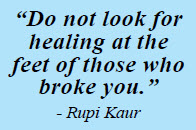Stepping Away From Domestic Violence
 By: Lisa Philippart
By: Lisa Philippart
In my last article, we took a look at the four truths of domestic violence: the abuse, the abuser, the cycle, and the dependency. But these truths do not have to be or become a part of your world. You can take control to recognize and free yourself from dangerous situations. We are going to discuss the steps to avoid getting involved with an abuser, and the steps to take if you are already in an abusive environment. I cannot stress enough for either scenario that it is essential to build outside resources, and to talk with those you trust about what’s going on in your relationship. A professional therapist is one of those resources because that person can help you build your self-esteem and learn how to help yourself, without feeling judged or rushed into taking action. If you can’t afford individual therapy, learn all you can from books and online resources, join online forums, and find a support group at a local women’s shelter.  Do these things even if it means keeping them a secret. Your life and your children’s lives may depend on it.
Do these things even if it means keeping them a secret. Your life and your children’s lives may depend on it.

The easiest way to avoid getting involved in an abusive relationship is to avoid getting involved with an abuser. I acknowledge that it can be difficult to identify someone who could be abusive. So, I recommend that you beware of someone who:
1. Criticizes you or family.
2. Is rude to you and others.
3. Displays anger outbursts.
4. Insists on having his or her way and will not compromise.
5. Presents with paranoia.
6. Is overly jealous or possessive.
7. Threatens you or your family.
Please pay attention to these signs! I know it can be difficult when someone is pursuing you and expressing love and affection. But remember this: An abuser won’t risk becoming abusive until he or she knows that you won’t leave. The abuser’s first step is to win you over and then isolate you from your family and friends. Many times the violence doesn’t begin until after the marriage or after the birth of a child, when you are less likely to leave. (But it can also escalate if you try to leave.) This is why it is so important to have a plan and support.
If you are already in an abusive situation, please don’t wait for the next attack. Call the National Domestic Violence Hotline at 1-800-799-SAFE. To prepare for an emergency, you can:
1. Have a safe place to go, like a friend or family’s home.
2. Open a bank account or credit card in your own name.
3. Let neighbors know to call the police if they hear loud noises or suspect a dangerous situation.
4. Make extra car and house keys. Hide a car key outside, so you and your children can get away.
5. Have a bag packed with important legal papers and cash. Pack a separate bag with clothes and comfort items for your children.
Remember, you have value and your life matters. Change takes courage.
By: Lisa Philippart,
Licensed Professional Counselor